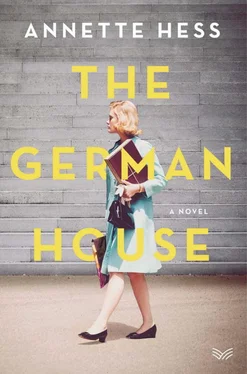Josef Gabor appeared beside her. He bowed slightly and thanked her. Eva nodded at him. Confused. Through the open door, she noticed that the gnarled man was observing her from his chair by the window. David Miller joined her in the hallway, pulling on his coat as he walked. “I’ll drive you.” He clearly wasn’t happy to.
Neither spoke in the car. The wipers moved fitfully, driving off the innumerable snowflakes from the windshield. David was beside himself. Eva could sense his fury.
“I’m sorry, but I just jumped in. Normally I just handle contracts…. It was absolutely horrible, what that man was—”
The car skidded narrowly past a streetlight. David cursed under his breath.
“What was he talking about? An incident from the war?”
David did not look at Eva. “You’re all so ignorant.”
“I beg your pardon?”
“You all think that the little brown men landed their spaceship here in ’33. Am I right? Then off again they went in ’45, after forcing this fascism thing on you poor Germans.”
It wasn’t until he spoke for a longer stretch that Eva could hear he wasn’t German. He had a slight accent, maybe American. And he placed his words very precisely. As though everything he said had been rehearsed.
“I’d like to get out, please.”
“And you’re just another one of the millions of idiot Fräuleins . I saw it the moment you got in the car. Oblivious and ignorant! Do you know what you Germans did?! Do you know what you did?!!”
“Stop the car this instant!”
David hit the brakes. Eva seized the handle, opened the door, and got out. “That’s right, just run away. I hope your German comfort ki—”
Eva slammed the door. She hurried through the falling snow. Suddenly everything was quiet, the furor behind her. The heavy vehicle swooped off. Eva thought, That driver, or whatever he is, isn’t mentally stable!
Jürgen’s car had disappeared from out in front of German House. Where he’d parked was covered in snow, as though Jürgen had never been there. The windows of the restaurant glowed warmly. The drone of voices inside could be heard from the street. Company Christmas parties. Those meant good business for them every year. Eva watched the silhouettes moving behind the panes. She saw her mother, laden with plates, approach a table and serve the guests swiftly, deftly. Chops. Schnitzel. Goose with red cabbage and the endless dumplings her father, the magician, formed with his soft, dexterous hands and sent into the seething salted water.
Eva wanted to go in, but she hesitated. For a moment, the place seemed like a maw that threatened to swallow her. Then she pulled herself together. Herr Gabor had experienced something terrible, but the question of the hour was: Had Jürgen asked for her hand in marriage?
As Eva stepped into the restaurant—into the human warmth, the haze of sizzling goose fat, the roomful of bodies, all a bit drunk and merry—her mother came up, balancing plates. Edith Bruhns was now wearing her work clothes: black skirt and white blouse, a white apron and her comfortable beige shoes. She whispered in alarm, “What happened to you? Did you fall?”
Eva shook her head indignantly. “Did he ask?”
“Talk to your father!” Edith turned and carried on serving.
Eva entered the kitchen. Her father was hard at work with his two helpers. Her father, in his white coat, dark trousers, chef’s hat on his head, his belly always pushed out a little in front, which gave him a funny look. Eva whispered, “Did he ask?” Her father opened an oven, which released a massive cloud of steam in his face. He didn’t appear to notice. He heaved a large pan of roast goose—two whole, brown birds—from the oven. He did not look at his daughter. “Nice young man. Decent.”
Eva sighed in disappointment. She had to struggle to keep from crying. Then her father came up to her. “He’ll ask, Eva, sweetheart. But if he doesn’t make you happy, heaven help him!”
That night, Eva lay in bed and stared at the ceiling. The streetlight in front of the house threw a shadow into her room that looked like a man on a horse. A tall man with a lance. Don Quixote. Eva studied him every night, the way he floated above her, and asked herself, What is it I’m fighting in vain? Eva thought of Jürgen and cursed her fear that he might leave at the last moment. Maybe women didn’t interest him. After all, who voluntarily decides to become a priest? Why hadn’t he ever touched her? Eva sat up, switched on the light on her bedside table, opened a drawer, and pulled out a letter. The only letter from Jürgen in which he’d written “I love you.” It was, however, preceded by “If I had to settle on a feeling, then I could definitely say that…” There it was. In Jürgen’s awkward way of expressing emotions, this was an untarnished confession of love! Eva sighed, placed the letter back in the bedside table, and turned off the light. She closed her eyes. She saw flakes swirling, and an indistinct façade with dark windows. She began to count them. At some point, she fell asleep. She did not dream of Jürgen. She dreamed of a hostel, far to the east. A hostel tastefully covered in flowers and grasses to keep out the wind and cold. She had invited many guests. As Eva and her parents served the crowd, the guests reveled heartily till early morning. Till none of them were breathing.
Monday. The city lay under a thick blanket of snow. Those responsible for the roads ate breakfast standing that morning while making phone calls about the precarious situation, only to spend the rest of the day in their overheated offices, being bombarded with complaints about vehicular damage and streets that hadn’t been cleared.
Mondays meant that German House was closed. Ludwig Bruhns got in his “weekly beauty rest” till nine. Annegret, who had gotten home from her shift earlier that morning, hadn’t made an appearance yet, either. The remaining family members ate breakfast in the big, bright kitchen that faced the back courtyard. The fir tree that towered there was covered in white, a few crows perching motionless in its branches, as though they couldn’t comprehend the snow. Stefan had stayed home, supposedly with a “beastly” sore throat. Edith Bruhns had feigned mercilessness and responded, “Well, someone decided to play in the snow without a coat…” But then she had rubbed his little chest with eucalyptus salve, which lent the kitchen a gentle aroma. She’d wrapped a scarf around his neck and was now slathering a third slice of bread with honey, which was good for sore throats. Meanwhile, she was also comforting Eva, who paged unhappily through the morning paper.
“Your worlds are too different. I can understand the attraction, child. But it would be the end of you. Just the thought of that estate. I know the ones, up there in the hills. People’s properties the size of ten soccer fields…”
“Can I play soccer up there?!” Stefan asked with his mouth full.
“After the first flush of love has faded,” Edith continued, “you need to represent. You need to keep a smile on your face and stay strong. And don’t expect much of your husband. He’s got such an important post, you’ll barely set eyes on him. You’ll be alone. And that’s not the life for you, Eva. It’ll make you sick. Your nerves always were so delicate….”
“Nerves.” The word bothered Eva every time she heard it. It was as though her nerves were something outside of her, cladding her body. As though her delicate nerves were a matter of having chosen the wrong clothing. Eva thought of Brommer’s Costumes, by the train station, a store as musty as it was magical, as dark, dangerous, and impenetrable as the jungle. Since childhood, she had loved plunging into their wares every year in preparation for Carnival. She imagined coming across strong nerves hanging among ruffled princess gowns on one of the store’s countless racks. A coat woven and knotted out of thick, steely strands. Impregnable, impossible to tear, protection from all pain. “Mum, that’s something you can learn! Just look at Grace Kelly. First an actress, and now she’s a princess….”
Читать дальше
Конец ознакомительного отрывка
Купить книгу












